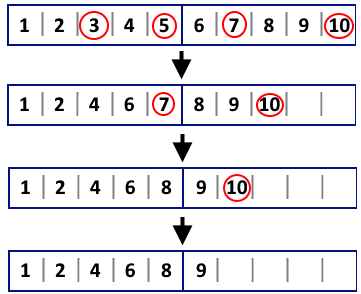Codeforces 1191C. Tokitsukaze and Discard Items 1190A. Tokitsukaze and Discard Items
Problem link
The order of discarding is given, so we can simulate the process of discarding.
In each time, we can calculate the page that contains the first special item that has not been discarded, and then locate all the special items that need to be discarded at one time. Repeat this process until all special items are discarded.
Each time at least one item would be discarded, so the time complexity is O(m).
A solution in c++
Tags

Posted by Zinnatul Islam Morol
I love to introduce myself as a competitive programmer. I have a strong motivation for writing server-side code. I take a special interest in Designing REST and GraphQL APIs, Open source contribution, Querying databases. I love to learn new things. I'm highly motivated and ready for newer challenges and want to learn new technologies.Followers
Search This Blog
Popular Posts

UVA 11172 - Relational Operator
Monday, January 22, 2018

Codeforces 4A Watermelon
Monday, January 22, 2018

UVA 12577 - Hajj-e-Akbar
Monday, January 22, 2018

বাংলা ভাষায় লেখা প্রোগ্রামিং এর সবচেয়ে বড় রিসোর্স কালেকশন
Saturday, September 08, 2018

Algorithm and programming Technique list (with relative links)
Saturday, September 08, 2018
Usefull Links
Popular Posts
Codeforces 1189B. Number Circle Codeforces Round #572 (Div. 2)
Tuesday, July 16, 2019

Codeforces A. Stages 1011A
Friday, July 27, 2018

Codeforces 1183C. Computer Game Codeforces Round #570 (Div. 3)
Thursday, July 18, 2019


0 Comments
If you have any doubts, Please let me know